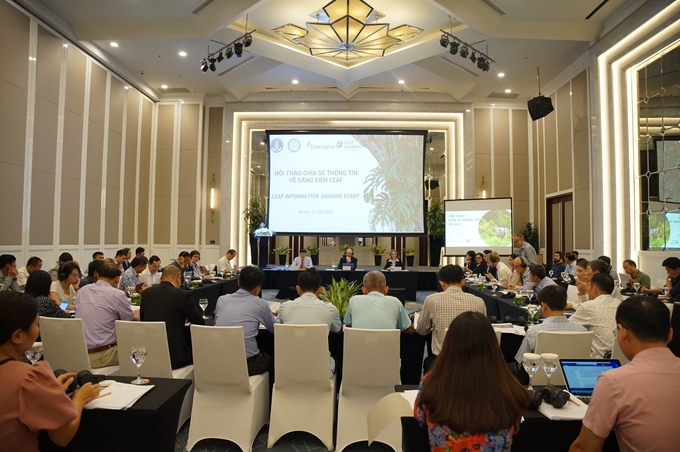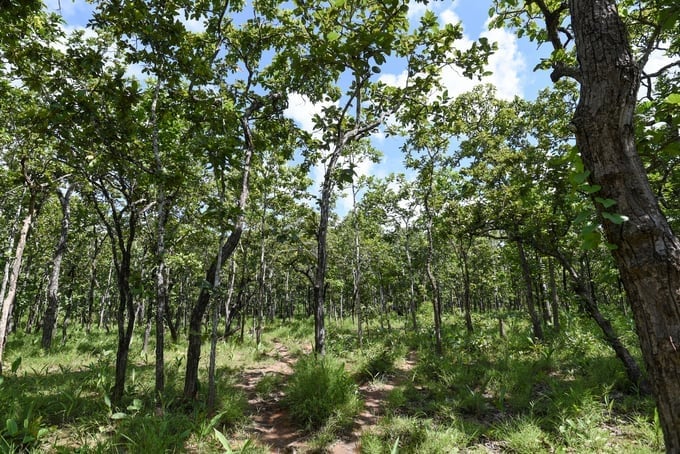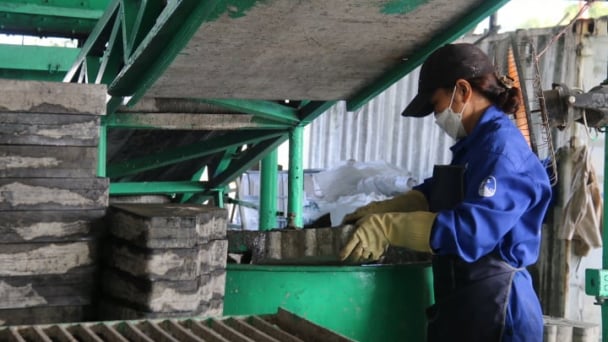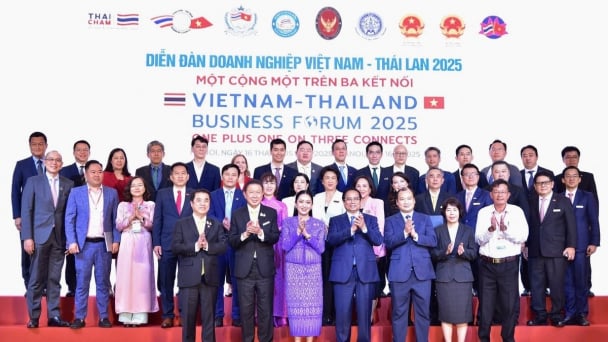May 19, 2025 | 16:12 GMT +7
May 19, 2025 | 16:12 GMT +7
Hotline: 0913.378.918
May 19, 2025 | 16:12 GMT +7
Hotline: 0913.378.918

The General Director of DoF Tran Quang Bao, the Chief Partnership Officer of Emergent Sean Frisby, and Counsellor Mette Møglestue, Deputy Head of the Norwegian Mission to Vietnam co-chaired the event.
To prepare for the ERPA negotiations, Emergent staff and Alliance for Lowering Emissions by Accelerating Forest Finance (LEAF) Participants visited Vietnam from September 26 -29, and organized a LEAF information sharing event together with DoF on September 27, with the technical assistance provided by the Environmental Defense Fund (EDF).
On September 27, Emergent, the coordinator of the LEAF Coalition and the Vietnam Department of Forestry (DoF) convened a national event to enlighten key stakeholders about the LEAF process in Vietnam today. The General Director of DoF Tran Quang Bao, the Chief Partnership Officer of Emergent Sean Frisby, and Counsellor Mette Møglestue, Deputy Head of the Norwegian Mission to Vietnam co-chaired the event.
The objective of the LEAF information sharing event is to share information about LEAF with ethnic minorities, local communities, development partners, and other key stakeholders in jurisdictions, such as Vietnam, which are preparing to negotiate and sign Emissions Reductions Purchase Agreements (ERPAs). Information-sharing events allow key stakeholders in credit-generating programs to ask questions and provide feedback.
The LEAF Coalition brings together forest nations, companies, and donor governments to facilitate transactions of high integrity jurisdictional forest carbon credits, issued by the independent Architecture for REDD+ Transactions (ART) program under the REDD+ Environmental Excellence Standard (TREES standard). The TREES standard guarantees the highest levels of environmental integrity and social safeguard. LEAF’s strict buyers’ criteria also ensure high levels of integrity from private sector buyers of credits. Companies can only participate in LEAF if they have strong decarbonization programs, ensuring that action through LEAF is in addition to, not instead of, internal emissions reductions.
The LEAF Coalition is supported by four governments (UK, USA, Norway, South Korea) and over 25 major companies (including Amazon, PWC, and Unilever) that have committed to tackling deforestation.
More than 100 participants made up of representatives of ethnic minorities and local communities at the national and provincial level attended the LEAF information sharing event. Other participants included representatives from the Ministries of Agriculture and Rural Development, Natural Resources and Environment, Finance, Planning and Investment, Justice, Committee of Ethnic Minority Affairs, and other socio-political organizations from eleven provinces in the Central Highlands and Southern Central Coast region.
Embassy personnel from LEAF donor governments, the United Kingdom, United States, Norway, and South Korea also attended as well as, national and international development partners including the Food and Agriculture Organization of the United Nations (FAO), the United Nations Environment Programme (UNEP), the US Forest Service (USFS), and the German Agency for International Cooperation (GIZ).
Director of the Forestry Department Tran Quang Bao informed that in October 2020, Vietnam signed an emission reduction payment agreement for 6 provinces in the North Central region with the World Bank (WB), Vietnam will transfer to WB 10.3 million tons, at a price of 5 USD/ton and 95% of this amount will be counted as Nationally Determined Contributions (NDC) contribution. To date, legal procedures and preparations have been ready and the World Bank has transferred 80% of the total funding to Vietnam, equivalent to 41.2 million USD.
At COP26 in Glasgow, Emergent and the Ministry of Agriculture and Rural Development of Vietnam (MARD) signed a Letter of Intent (“LOI”) under which they agreed to initiate negotiations of an emission reduction purchase agreement ("ERPA") for Vietnam to supply jurisdictional REDD+ credits to the LEAF Coalition.
Accordingly, Vietnam aims to sell 5.15 mtCO2e to the LEAF Coalition at a guaranteed floor price of USD 10 per tCO2e between 2022 and 2026. Such emission reductions are expected to be generated from 4.26 million ha of forest, including 3.24 million ha of natural forest and 1.02 million ha of plantation forest, in the Central Highlands and the Southern Central Coast regions.

To date, legal procedures and preparations have been ready and the World Bank has transferred 80% of the total funding to Vietnam, equivalent to 41.2 million USD. Photo: Tung Dinh.
The South Central and Central Highlands regions with a total forest area of about 4.29 million hectares (natural forests 3.16 million hectares; planted forests 1.13 million hectares) account for over 29% of the country's forest area and are of considerable importance. To implement the LEAF initiative, forest resources and biodiversity have been selected in particular.
Mr. Le Thanh Son, Deputy Director of the Department of Agriculture and Rural Development of Binh Thuan province, disclosed that Binh Thuan is one of eleven provinces anticipated to implement the ERPA Agreement within the framework of cooperation between Vietnam and the LEAF Alliance. Consequently, Binh Thuan province is very concerned with the management, protection, and development of the province's forests, and the province has integrated the preparation of REDD+ activities into the management, protection, and development of the province's forests.
"This is a requirement for the province of Binh Thuan to demonstrate its readiness to participate in carbon market-related programs when implemented at all levels. With a relatively large natural forest area of more than 296 thousand hectares, participating in trading to reduce emissions through carbon credits will bring an important source of funding for the province to continue investing in management and forest protection and development; contributing to improving the lives and livelihoods of ethnic minority households in particular, and households living in close proximity to forests in general; and sharing and reducing pressure on local investors.
Mr. Vu Dinh Cuong, director of the Forest Protection Department for the province of Lam Dong, expressed some difficulties in implementing the emission reduction program in Vietnam during the workshop. Mr. Cuong noted that results-based compensation for forest environmental services in the province has not yet manifested due to the REDD+ mechanism's additional requirements and barriers.
In addition, despite efforts to strengthen the capacity of international organizations, the REDD+ mechanism continues to involve a number of complex forest governance issues. Consequently, the management department's capacity to respond to reception and implementation is hampered by numerous obstacles. Participating parties must continue to exert greater effort toward integrating REDD+ content and integrating it into the forest sector policy system, as well as achieving other socioeconomic objectives.
Mr. Cuong proposed that the Ministry and its subdivisions continue to support the province in connecting international cooperation projects and programs to mobilize support for technical and financial resources to continue implementation in order to complete the emission reduction factors in accordance with the road map.
Translated by Dieu Linh

(VAN) The German Agricultural Society (DLG) explores the possibility of establishing a mechanization service center in Vietnam’s Mekong Delta to support farmers in accessing and utilizing advanced machinery.

(VAN) On May 16, the Department of Water Resources Management, in collaboration with the Food and Agriculture Organization of the United Nations (FAO), held a signing ceremony for the GEF-8 project document.

(VAN) Food safety, mechanization, vocational training, and market opening are key areas of cooperation expected between the Vietnamese Government and the Federal Republic of Germany.

(VAN) Deputy Minister Nguyen Quoc Tri also expressed his hope that Cuba will soon overcome its current challenges, attain food security, and further expand cooperation with Vietnam.

(VAN) The project contributes to enhancing the resilience of communities vulnerable to the impacts of climate change, with a primary focus on local women.

(VAN) Green materials help save energy and resources. However, after more than 10 years, Vietnam has only developed over 200 green buildings with more than 6 million square meters of floor space.

(VAN) Vietnam - Thailand Business Forum 2025: One plus one on three connects, marking a milestone in the comprehensive strategic partnership between the two nations.